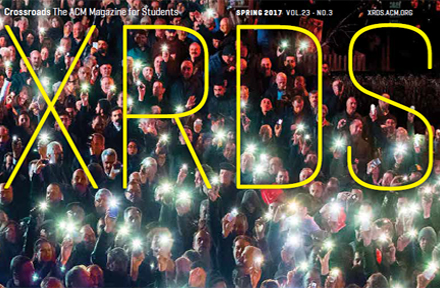Magazine: Spring 2017 | Volume 23, No. 3

Globalization is a double-edged sword: powerfully positive for the human race but also positioned to be used and abused in human conflicts and crises on a local and global scale. This issue of XRDS explores some of today's most notable crises and the role technologies have played in addressing them. This issue also presents ideas and arguments from leading experts in several vertical categories of science and technology to give a holistic view on tech for crises.
Download
- Digital Edition web-based magazine available for subscribers – sign in
- PDF via ACM’s Digital Library
COLUMN: Advice
How to manage your advisor
Getting a Ph.D. is a challenge, but in theory at least, students have a lot of support.
By Andrew J. Hunsucker
DEPARTMENT: Updates
Uppsala University ACM-W
Gender equality in computer science
By Anshuman Majumdar
COLUMN: Careers
In praise of soft skills
Consider what it takes to stand out as more than just a "good" candidate.
By Christopher Hazlett
SECTION: Features
Mapping organized ignorance in environmental health
How data collection and reporting standards have shaped what we know and do not know about water contamination in Hoosick Falls, NY.
By Laura Rabinow, Lindsay Poirier
The cognitive and immersive situations room
Cognitive environments with "eyes," "ears," "mind," "mouth," and "hands" will converse with people, understand group dynamics, present stories, and augment group intelligence, enabling humans and computers to accomplish things neither could do alone.
By Hui Su
From social movements to social surveillance
How the technology of the Occupy movement became a mobile app for policing.
By Joan Donovan
Biological obstacles and technological leaps
Technology can address biological threats like viral epidemics and bioterrorism that could put humankind on the brink of biological disaster.
By Ketaki Katdare
Filter bubbles and fake news
The results of the 2016 Brexit referendum in the U.K. and presidential election in the U.S. surprised pollsters and traditional media alike, and social media is now being blamed in part for creating echo chambers that encouraged the spread of fake news that influenced voters.
By Dominic DiFranzo, Kristine Gloria-Garcia
Managing crises, one text at a time
Crisis Text Line CTO Jason Bennett shares his insight on the technology behind this helpline using text to reach people in need of counseling during times of crisis.
By Rahul R. Divekar, Nidhi Rastogi
Serving people in crisis to make the world a better place
Carolin Silbernagl, who leads betterplace lab, the research arm of betterplace.org in Berlin, Germany, is a social technologist, as well as co-founder of dotHIV. Here, she shares what it takes to make betterplace, the first mover in the area of digital social startups in Germany.
By Nidhi Rastogi, Rahul R. Divekar
SECTION: Features
Online censorship, cyberattacks, and access to information
Dan Keyserling, head of communications at Jigsaw, an incubator within Alphabet, shares how technology can help address global challenges, especially on the front lines of press freedom, political repression, and human rights.
By Nidhi Rastogi
The Heidelberg Laureate Forum on the moving frontier between mathematics and computer science
Young and early-career researchers at the 2016 Heidelberg Laureate Forum discuss how the frontier between mathematics and computer science is shifting, what the future promises, and the implications the frontier's shape and dynamics will have on both fields.
By Edmon Begoli, Vincent Schlegel, Michael Atiyah, Praise Adeyemo, Tim Baarslag
Data analytics, accelerators, and supercomputing
The Message Passing Interface faces new challenges as modern concepts and technologies like data analytics and accelerators penetrate high-performance computing. Here, we discuss the future of MPI with HPC expert Prof. Torsten Hoefler of ETH Zürich, Switzerland.
By Vasileios Kalantzis



















